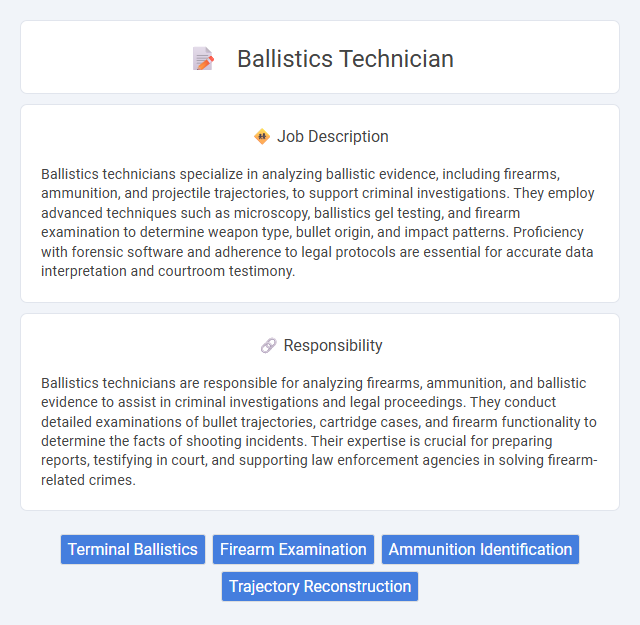
Ballistics technicians specialize in analyzing ballistic evidence, including firearms, ammunition, and projectile trajectories, to support criminal investigations. They employ advanced techniques such as microscopy, ballistics gel testing, and firearm examination to determine weapon type, bullet origin, and impact patterns. Proficiency with forensic software and adherence to legal protocols are essential for accurate data interpretation and courtroom testimony.
Individuals with strong analytical skills and attention to detail are likely to be well-suited for a ballistics technician role due to the job's demand for precision in testing and analyzing ballistic data. Candidates comfortable working with technology and scientific equipment might have a higher probability of success in this field. Those who prefer routine tasks or have difficulty focusing on complex technical procedures may find this job challenging.
Qualification
Ballistics technicians require a strong foundation in chemistry, physics, and forensic science, often supported by a bachelor's degree in forensic science, criminal justice, or a related field. Proficiency in analyzing firearm-related evidence, knowledge of ballistics software, and hands-on experience with firearms testing are critical qualifications. Certification from professional organizations such as the American Board of Criminalistics (ABC) enhances credibility and career advancement opportunities.
Responsibility
Ballistics technicians are responsible for analyzing firearms, ammunition, and ballistic evidence to assist in criminal investigations and legal proceedings. They conduct detailed examinations of bullet trajectories, cartridge cases, and firearm functionality to determine the facts of shooting incidents. Their expertise is crucial for preparing reports, testifying in court, and supporting law enforcement agencies in solving firearm-related crimes.
Benefit
Ballistics technicians likely benefit from a highly specialized skill set that is in demand within law enforcement, military, and forensic sectors, potentially leading to strong job security. There may be opportunities for professional growth and advancement through certifications and experience, which can increase earning potential. Working in this field often offers the chance to contribute to public safety and criminal justice, providing a sense of purpose and job satisfaction.
Challenge
A Ballistics technician will likely face complex challenges involving precise analysis of firearm-related evidence and intricate crime scene reconstruction. The role may require adapting to rapidly evolving technologies and methods to accurately interpret ballistic data under tight deadlines. Problem-solving skills could be essential to overcome obstacles in identifying key ballistic signatures and ensuring the integrity of forensic investigations.
Career Advancement
Ballistics technicians gain expertise in analyzing firearm-related evidence, opening pathways to advanced roles such as forensic ballistics analyst or crime lab supervisor. Continuous certification in ballistic analysis software and participation in law enforcement training enhance promotion opportunities within forensic science departments. Mastery in ballistics report writing and courtroom testimony preparation further supports career growth into expert witness or consultancy positions.
Key Terms
Terminal Ballistics
Terminal ballistics experts analyze the behavior and effectiveness of projectiles upon impact with various targets, optimizing ammunition design for maximum efficiency and safety. Ballistics technicians conduct extensive testing using high-speed imaging and sensor data to evaluate penetration, energy transfer, and projectile deformation. Their work is crucial in military, law enforcement, and forensic applications, improving weapon performance and enhancing protective gear development.
Firearm Examination
Ballistics technicians specializing in firearm examination analyze cartridge cases, bullets, and gunshot residue to determine weapon type, firing distance, and trajectory. They utilize comparison microscopes and ballistic databases to match projectiles with suspected firearms, aiding criminal investigations and court cases. Expertise in forensic ballistics and advanced microscopy techniques is essential for accurately interpreting ballistic evidence.
Ammunition Identification
Ballistics technicians specializing in ammunition identification analyze various types of projectiles and cartridges to determine their origin, composition, and functionality. Utilizing advanced forensic tools and databases, they classify ammunition based on caliber, manufacturer markings, and ballistic performance. Their precise identification aids law enforcement agencies in criminal investigations and enhances weapon-related forensic evidence accuracy.
Trajectory Reconstruction
Ballistics technicians specializing in trajectory reconstruction analyze ballistic evidence to determine the path of projectiles in criminal investigations. They utilize advanced tools like 3D modeling software, laser trajectory kits, and forensic ballistics databases to reconstruct shooting scenes with high accuracy. Precise trajectory reconstruction aids law enforcement in understanding shooting dynamics, validating eyewitness accounts, and supporting courtroom evidence.
 kuljobs.com
kuljobs.com